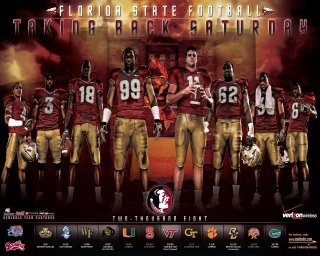Florida State would play two football games in 1947 before students demanded the school acquire a symbol. While details conflict, most believe the account of a student body poll is accurate. The Florida Flambeau reported that "Seminoles" had won by 110 votes over "Statesmen." The rest of the top contenders in order were "Rebels," "Tarpons," "Fighting Warriors" and "Crackers." In the 1950's, a pair of students dressed in "Indian" costume joined the cheerleaders on the field which eventually evolved into the majestic symbol of Osceola and Renegade that FSU enjoys today.
The history of the Seminole Indians in Florida is the story of a noble, brave, courageous, strong and determined people who, against great odds, struggled successfully to preserve their heritage and live their lives according to their traditions and preferences. From its earliest days as a university, Florida State has proudly identified its athletic teams with these heroic people because they represent the traits we want our athletes to have. Other athletic teams are called Patriots or Volunteers in the same way. They use a symbol that represents qualities they admire.
Recent critics have complained that the use of the Indian symbolism is derogatory. Any symbol can be misused and become derogatory. This, however, has never been the intention of Florida State.
Over the years,FSU has worked closely with the Seminole Tribe of Florida to ensure the dignity and propriety of the various Seminole symbols we use. Chief Osceola, astride his appaloosa when he plants a flaming spear on the 50-yard line, ignites a furious enthusiasm and loyalty in thousands of football fans, but also salutes a people who have proven that perseverance with integrity prevails.
Some traditions the school cannot control. For instance, in the early 80's, when our band, the Marching Chiefs, began the now-famous arm motion while singing the "war chant," who knew that a few years later the gesture would be picked up by other team's fans and named the "tomahawk chop?" It's a term we did not choose and officially do not use.
The university's goal is to be a model community that treats all cultures with dignity while celebrating diversity.
The good relationship with the Seminole Tribe of Florida is one FSU has cultivated carefully and one they hope to maintain, to the benefit of both the Seminoles of our state and university. Seminole Tribe of Florida Chairman James E. Billie express this point in these words: "We are proud to be Seminoles, and we are proud of the Florida State University Seminoles. We are all winners."
Twitter Updates
Sunday, April 23, 2006
Seminole Traditions: The Seminoles
Posted by
tallynolefan
at
11:25 PM
![]()
Subscribe to:
Post Comments (Atom)





No comments:
Post a Comment